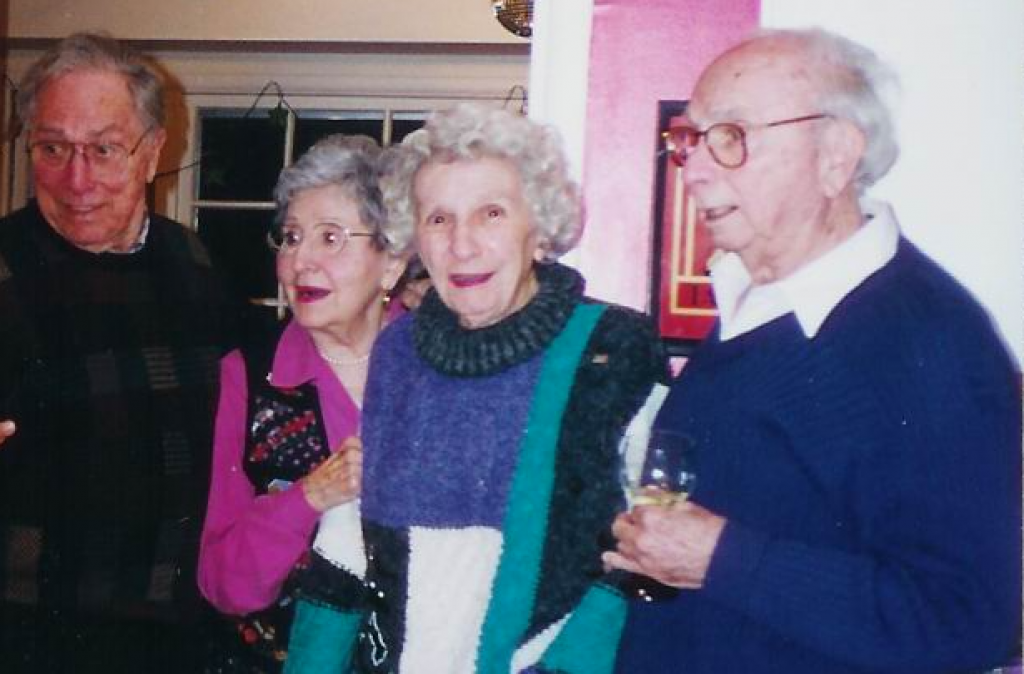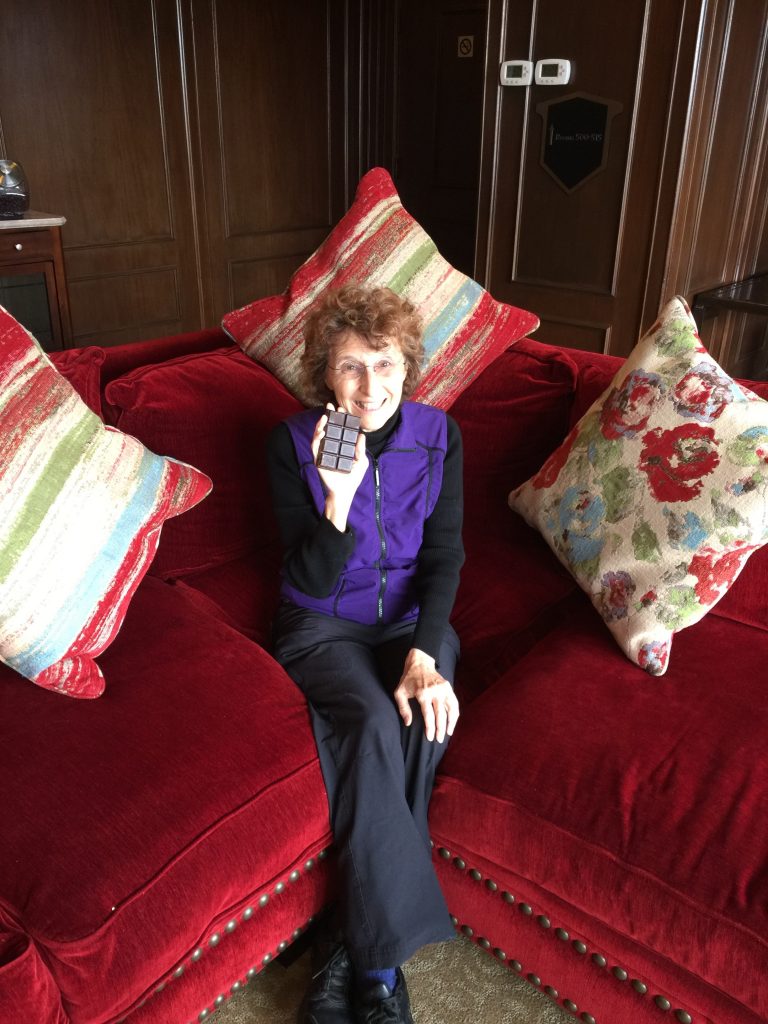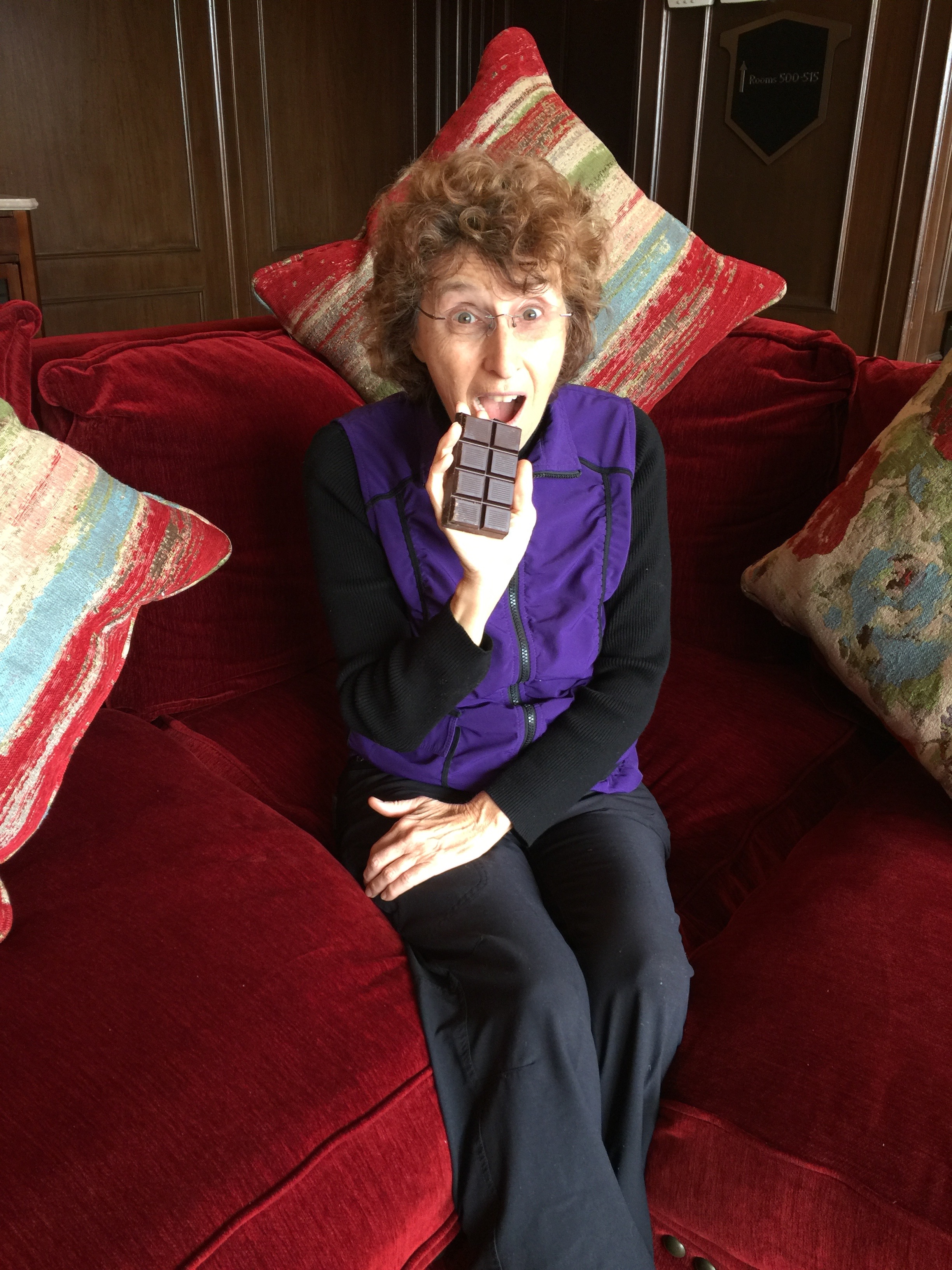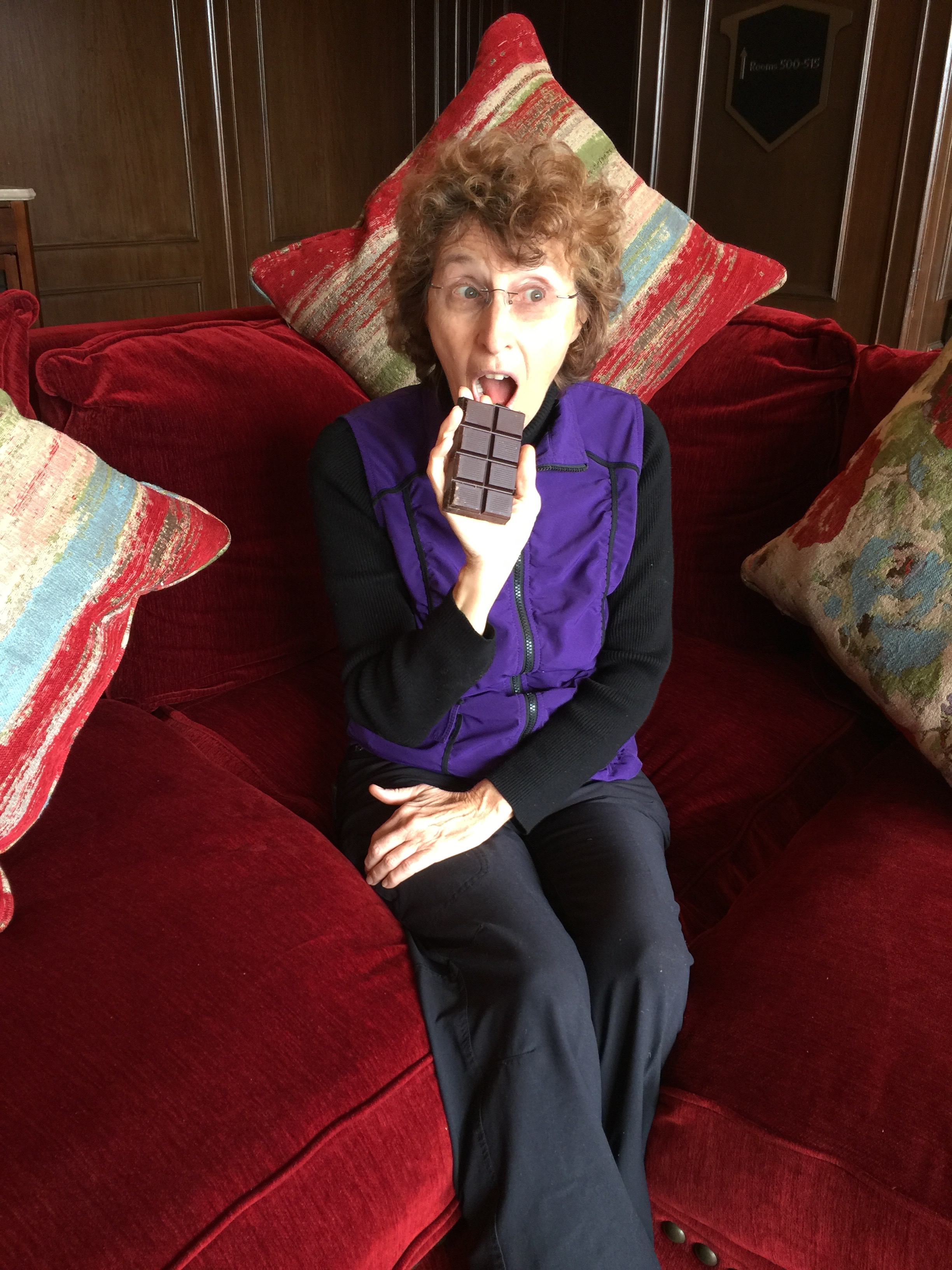Posts Tagged ‘chocolate’
Five Ways to Make Valentine’s Day Special for a Loved One Living with Dementia
My parents liked to celebrate Valentine’s Day with dinner and dancing. Years into my mom’s Alzheimer’s journey, my parents’ love hadn’t diminished, but my mom’s capacity for going out to dinner and dancing had drastically decreased. I saw how blue my father was—one more event he had to give up, one more change in the woman he loved—and I searched for alternatives that might cheer him up. Here are five ways to make Valentine’s Day special.
Look for a favorite thing. Seek one simple pleasure your loved one might enjoy. Mom loved potato soup and chocolate and fresh strawberries. These were part of our celebration.
Nurture yourself: include your own favorite thing. Bring yourself into the celebration and include something that makes you happy. I brought foods my father and I both liked as part of our little party.
Pick several ways to express your love. Poetry, music, gifts, flowers, and photo albums—you can use any of these resources as a catalyst to talk about your feelings. Dad and I sang Mom old show tunes and love songs, music she really enjoyed. Mom adored Shakespeare; we had a couple of sonnets on hand. She and Dad had once created a beautiful flower garden; Dad brought her a single red rose.
Take joy in the simple act of expressing yourself. Being with my mom was a chance to really practice the mythical “unconditional love.” Mom couldn’t tell me she loved me. During one Valentine’s Day celebration, she fell asleep while I was holding her hand and talking sweetly to her. But there was a comfort in expressing my love and I kept on talking.
Celebrate love in all its glorious guises. During their long marriage, my father had walked into a room millions of times and often, Mom had been busy and hadn’t particularly smiled or remarked. But with her dementia came a deep dependency on Dad. When Dad walked into a room, my mother’s face lit up. My father basked in that light. The sparkle in my mother’s eyes was the new, “I love you, darling.” The light said everything my mother could no longer say.
Deborah Shouse is the author of Connecting in the Land of Dementia: Creative Activities to Explore Together and Love in the Land of Dementia: Finding Hope in the Caregiver’s Journey.
Chocolate Boosts Brain Health!
As the daughter of someone who lived with dementia, I do a lot of things to boost my brain health. I try to walk 10,000 steps a day, along with other exercise. I eat blueberries and broccoli. I do squats, try to memorize a few words of Spanish, and think about taking harmonica lessons. I try new things, laugh often, and practice drawing. But a recent study revealed that I was intuitively doing something else that was cheering on my brain, something I hadn’t even counted. Just in time for Halloween, it turns out Chocolate Boosts Brain Health!
I recently encountered a fascinating study on the Harvard Health website, and was intrigued when I read this headline: Cocoa: a sweet treat for the brain
Imagine being in Italy and contributing to scientific research by drinking a luscious dark cocoa drink every day for eight weeks. Then imagine feeling even more lucid, vibrant, and healthy after that experience. That is the essence of the Cocoa, Cognition, and Aging (CoCoA) Study, published in the American Journal of Clinical Nutrition in December 2014, with this flavorful title: Cocoa flavanol consumption improves cognitive function, blood pressure control, and metabolic profile in elderly subjects. (Note: It turns out some of the “elderly” subjects are as young as 61, an age some of us may argue is merely “middle-age.”)
A Chocolate Boost Makes Your Brain Boast
I am also in love with this Maine-Syracuse Longitudinal Study (MSLS), of 968 people that includes these mouth-watering assertions:
All cognitive scores were significantly higher in those who consumed chocolate at least once per week, than in those who never/rarely consumed chocolate.
“More frequent chocolate consumption was significantly associated with better performance on the Global Composite score, Visual-Spatial Memory and Organization, Working Memory, Scanning and Tracking, Abstract Reasoning, and the Mini-Mental State Examination,” said the research team, which included scientists from the University of Maine.
More Delicious Cocoa-flavored News
And another study from Loma Linda University, states:
“Dark chocolate, which is 70 percent cacao, is a major source of flavonoids –- powerful antioxidant and anti-inflammatory components that are known to be beneficial to cardiovascular health. The California team’s initial studies at Loma Linda University have shown that absorbed cacao flavonoids penetrate and accumulate in regions of the brain associated with learning and memory.”
“We are tremendously excited about what these findings could potentially mean for brain health,” said Lee Berk, DrPH, MPH, who led the team. “This may open the door for potential restorative uses for individuals with memory/recall or dementia and aging-related issues.”
Never Forget To Boost Your Brain
I now have a remedy for those days when I’m too tired to exercise, too busy for a crossword, too cranky for a brain game. Or for when I simply forget. On those days, I’ll simply treat myself to a taste of the dark side. And hope it leads me towards the light.
Want to learn more?
http://www.goodnewsnetwork.org/study-confirms-brain-and-memory-benefits-from-dark-chocolate/
http://www.health.harvard.edu/blog/cocoa
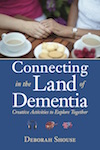
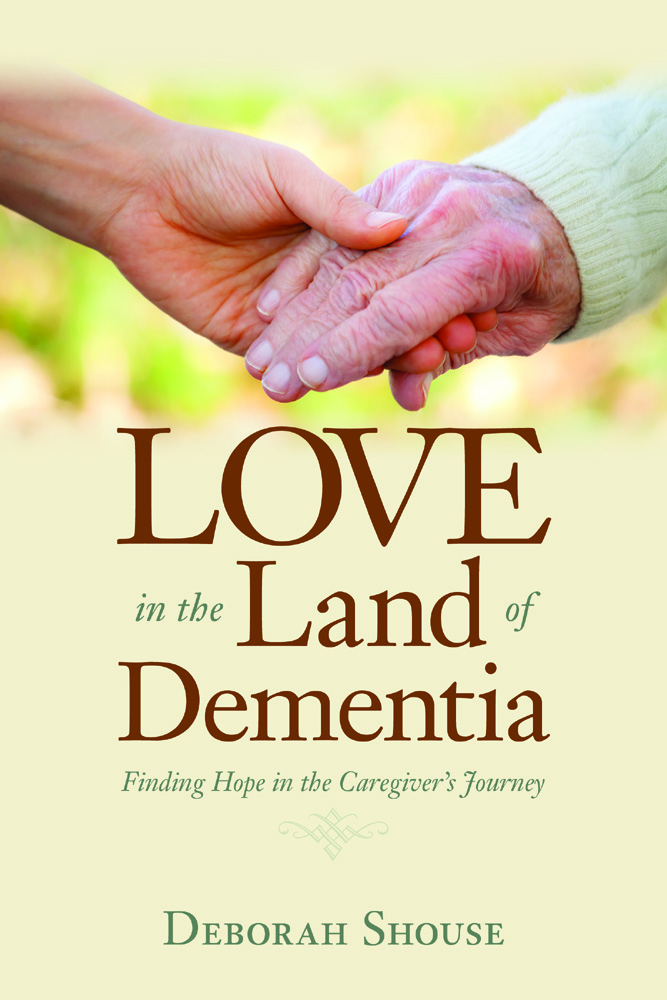
Chocolate Boosts Brain Health
As the daughter of someone who lived with dementia, I do a lot of things to boost my brain health. I try to walk 10,000 steps a day, along with other exercise. I eat blueberries and broccoli. I do super brain yoga squats, try to memorize a few words of Spanish, and think about taking harmonica lessons. I try new things, laugh often, and practice drawing. But a recent study revealed that I was intuitively doing something else that was cheering on my brain, something I hadn’t even counted. It turns out Chocolate Boosts Brain Health!
I recently encountered a fascinating study on the Harvard Health website, and was intrigued when I read this headline: Cocoa: a sweet treat for the brain?
Imagine being in Italy and contributing to scientific research by drinking a luscious dark cocoa drink every day for eight weeks. Then imagine feeling even more lucid, vibrant, and healthy after that experience. That is the essence of the Cocoa, Cognition, and Aging (CoCoA) Study, published in the American Journal of Clinical Nutrition in December 2014, with this flavorful title: Cocoa flavanol consumption improves cognitive function, blood pressure control, and metabolic profile in elderly subjects. (Note: It turns out some of the “elderly” subjects are as young as 61, an age some of us may argue is merely “middle-age.”)
A Chocolate Boost Makes Your Brain Boast
I am also in love with this Maine-Syracuse Longitudinal Study (MSLS), of 968 people that includes these mouth-watering assertions:
All cognitive scores were significantly higher in those who consumed chocolate at least once per week, than in those who never/rarely consumed chocolate.
“More frequent chocolate consumption was significantly associated with better performance on the Global Composite score, Visual-Spatial Memory and Organization, Working Memory, Scanning and Tracking, Abstract Reasoning, and the Mini-Mental State Examination,” said the research team, which included scientists from the University of Maine.
More Delicious Cocoa-flavored News
And another study from Loma Linda University, states:
“Dark chocolate, which is 70 percent cacao, is a major source of flavonoids –- powerful antioxidant and anti-inflammatory components that are known to be beneficial to cardiovascular health. The California team’s initial studies at Loma Linda University have shown that absorbed cacao flavonoids penetrate and accumulate in regions of the brain associated with learning and memory.”
“We are tremendously excited about what these findings could potentially mean for brain health,” said Lee Berk, DrPH, MPH, who led the team. “This may open the door for potential restorative uses for individuals with memory/recall or dementia and aging-related issues.”
Never Forget To Boost Your Brain
I now have a remedy for those days when I’m too tired to exercise, too busy for a crossword, too cranky for a brain game. Or for when I simply forget. On those days, I’ll simply treat myself to a taste of the dark side. And hope it leads me towards the light.
Want to learn more?
http://www.goodnewsnetwork.org/study-confirms-brain-and-memory-benefits-from-dark-chocolate/
http://www.health.harvard.edu/blog/cocoa
Deborah Shouse is the author of Connecting in the Land of Dementia: Creative Activities to Explore Together and Love in the Land of Dementia: Finding Hope in the Caregiver’s Journey.
My Favorite Form of Brain Fitness
As the daughter of someone who lived with dementia, I do a lot of things to promote my brain health. I try to walk 10,000 steps a day, along with other exercise. I eat blueberries and broccoli. I work on crossword puzzles, occasionally flirt with a new language, try new things, and sing. But a recent study revealed that I was doing something else that was cheering on my brain, something I hadn’t even counted….
Yes, eating dark chocolate. I am in love with this Maine-Syracuse Longitudinal Study (MSLS), of 968 people that asserts:
All cognitive scores were significantly higher in those who consumed chocolate at least once per week, than in those who never/rarely consumed chocolate.
“More frequent chocolate consumption was significantly associated with better performance on the Global Composite score, Visual-Spatial Memory and Organization, Working Memory, Scanning and Tracking, Abstract Reasoning, and the Mini-Mental State Examination,” said the research team, which included scientists from the University of Maine.
More Delicious News
And another study from Loma Linda University states:
“Dark chocolate, which is 70 percent cacao, is a major source of flavonoids– powerful antioxidant and anti-inflammatory components that are known to be beneficial to cardiovascular health. The California team’s initial studies at Loma Linda University have shown that absorbed cacao flavonoids penetrate and accumulate in regions of the brain associated with learning and memory.
“We are tremendously excited about what these findings could potentially mean for brain health,” said Lee Berk, DrPH, MPH, who led the team. “This may open the door for potential restorative uses for individuals with memory/recall or dementia and aging-related issues.”
Never Forget To Boost Your Brain
I now have a remedy for those days when I’m too tired to exercise, too busy for a crossword, too cranky for a brain game. Or for when I forget. On those days, I’ll simply treat myself to a taste of the dark side. And hope it leads me towards the light.
Want to learn more?
www.goodnewsnetwork.org/study-confirms-brain-and-memory-benefits-from-dark-chocolate/
www.sciencedirect.com/science/article/pii/S0195666316300459
Deborah Shouse is the author of Love in the Land of Dementia: Finding Hope in the Caregiver’s Journey. 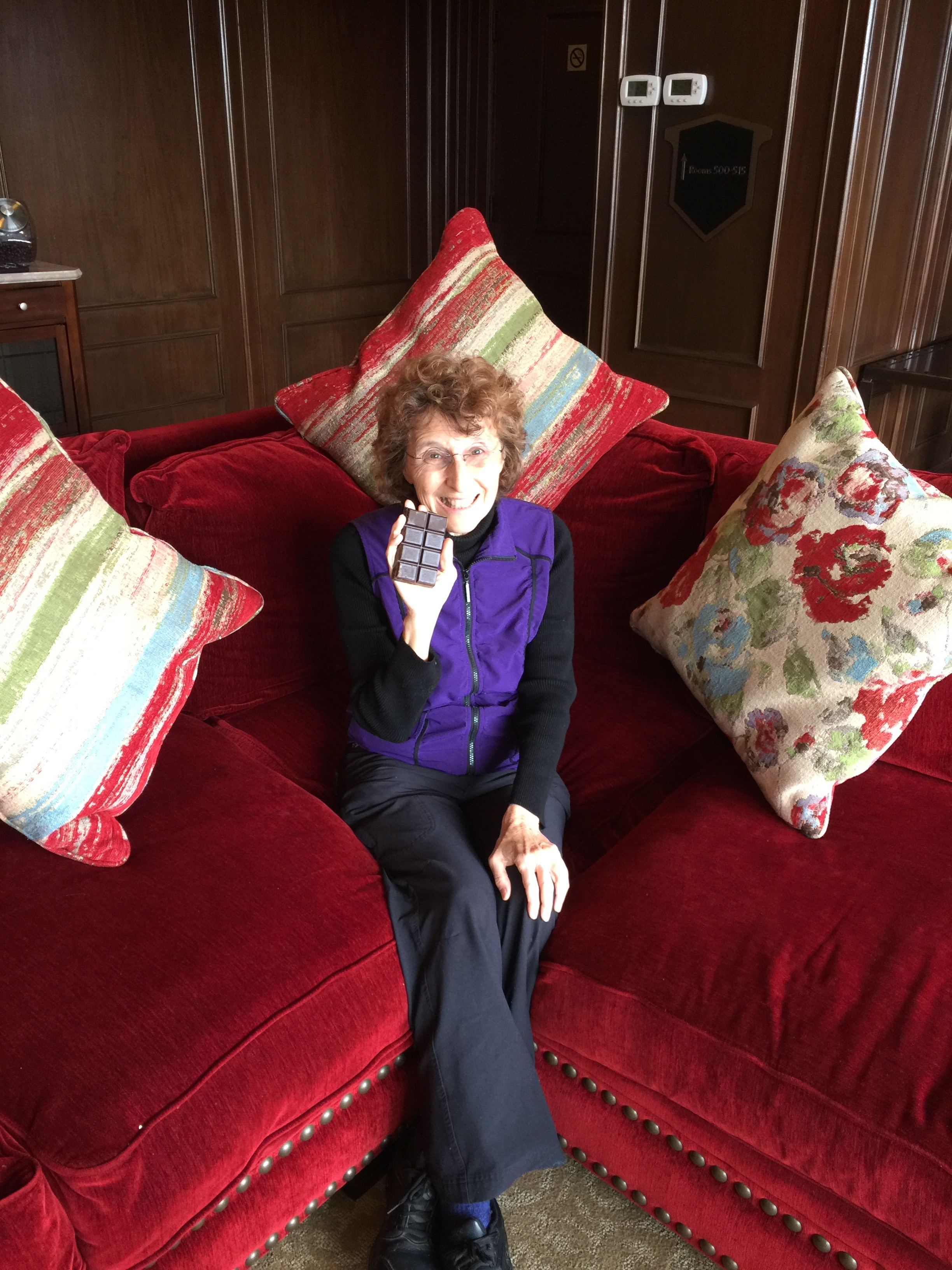
Six Tips for Surviving the Holiday Season When a Loved One Has Dementia
Normally, Thanksgiving was my favorite holiday, a time our family gathered together at my Kansas City home. But that November, my stomach clenched at the thought of our traditional Thursday evening meal.
My mother had Alzheimer’s and the holiday would be different. I felt alone but of course I wasn’t: there were 15 million family/friend caregivers helping the five million Americans who have dementia.
I’d been through my initial storm of denial and grief. I felt I’d been coping well with Mom’s diagnosis, focusing on offering my father extra support and trying to flow with Mom’s now spotty memory and personality quirks. But a pre-season sadness invaded me in October and I found myself dreading the alleged festivities. How could we have our usual holiday dinner, take our after dinner walks, play Scrabble and Hearts and Charades without Mom’s participation? How could we enjoy going to movies and plays when Mom was having trouble focusing and sitting still? And how would Mom react to the situation: would she feel uncomfortable and out of place? Would Dad feel protective and anxious? And more important, what would we have for dessert! Mom was legendary for her chocolate and butterscotch brownies, date crumbs, and bourbon balls. No store-bought cookies would compare.
As I stewed over the prospect of a depressing Thanksgiving weekend, I remembered the vows I had made: I had promised I would try to stay connected to Mom throughout her Alzheimer’s journey. And I had promised to see the gifts and blessings and fun in the experience.
So I began thinking: if the holiday is going to be different, why not concentrate on making it different in a creative and connective way? Here are some ideas I used to make the holiday work for me.
- Acknowledge my feelings of loss and grief. I wrote them down and shared them with a few friends. Just expressing myself made me feel stronger.
- List what I would miss most during the holiday season. My list included cooking with Mom, eating her brownies and rum balls. I asked my brother, who’s a terrific baker, to make some of our favorite sweets and I set up a place in the dining room where Mom could sit next to me while I chopped mushrooms and peeled potatoes.
- Create an activity to give our holiday a new focus. We created a simple holiday scrapbook called, “The Little Kitchen that Could,” complete with a family photo shoot and a playful script.
- Appreciate my blessings. We started our Thanksgiving meal by asking everyone to name one thing he or she was grateful for. I continued my gratitude practice throughout the holiday season, either alone or with others via telephone and social media.
- Take extra good care of myself. I treated yourself as I would a friend who’d suffered a deep loss.
- Set up a lifeline. “I’m worried about melting down,” I told my friend. She urged me to call anytime for encouragement and reassurance.
These six steps helped me enjoy my holiday and appreciate my mom just as she was. Our holiday was “different” but it was also wonderful.
Deborah Shouse is the author of Love in the Land of Dementia: Finding Hope in the Caregiver’s Journey.
A Halloween Surprise
For months, I’ve been working on my book on dementia and creativity. I’ve been so inspired by all the artistic people who know so many exciting ways to connect through creativity.
My mother’s sense of creativity and playfulness thrived in her last years. But there was one other part of her that was also in full force as well. See if you can identify with this Halloween tale that I first shared last year.
Do you remember trick or treating as a kid, racing down the street, dressed as a superhero or a princess or a witch, eager for treats? When I was growing up, I loved the freedom and surprise of that holiday and I continue to love the scintillating spookiness and dramatic dress of the holiday. Here’s a story about a Halloween gift I received in a memory care unit. Click here if you’d like to watch a video of the story or read on, if you prefer the written word. Either way, I hope you’ll “treat” yourself right this October 31.
Warmly,
Deborah
My Caregiver’s Two-Letter Halloween Treat
On my mother’s last Halloween, her memory care unit held a party. Pam, the nurse, brought a basket brimming with hats, shawls, and scarves. Pam set a floppy white hat on Mom’s silvery curls and draped a lacy purple shawl over her shoulders. In her new adornments, Mom looked both puzzled and happy.
But during the “treat” portion of the Halloween celebration, which featured M & M’s and chocolate chip cookies, Mom’s smile was unambiguous. All her life, Mom had adored sweets and her Alzheimer’s had not dimmed her enjoyment.
Then small children paraded through the facility, dressed as princesses, witches, super heroes, and ghosts. Volunteers handed the residents wrapped tootsie rolls.
“For the children,” they said.
Mom smiled at the adorable kitty cats and pirates who chanted “Trick or treat,” in wispy voices, but she did not relinquish her hold on the sweets; she did not share her candy.
“Mom, would you like to give the children some of your candy?” I asked as my mother gripped her treasure.
“No,” she said.
No. The word floated through my mind and I gazed at Mom, my mouth open, my mind euphoric. Perhaps I should have been chagrined at her selfishness but instead I was thrilled that she had actually responded to my question. It was the closest we’d come to conversation in weeks. I laughed with delight. Mom laughed.
For that moment, we were two women, laughing at ourselves, laughing at life, simply laughing. For me, it was a most wondrous and unexpected treat.
*****
Please share one of your unexpected treats.
Deborah Shouse is the author of Love in the Land of Dementia: Finding Hope in the Caregiver’s Journey.
Taking a Dose from the Culinary Pharmacy
“Did you remember to pack my medication?” I ask Ron.
We are sitting in our dining room, eating breakfast before taking off on a trip to the Black Hills.
“I did,” he says, swallowing the last bite of his omelet. “Do you need any right now?”
“Maybe just a small dose.”
Ron dashes upstairs to his secret cache of very important stuff and extracts the vital substance. He returns and hands me a small chunk of rich dark chocolate. This is my self- prescribed treatment for many of life’s challenges, both at home and on the road, including craving sweets, sour stomach, homesickness, and worry.
For years, I’ve felt dark chocolate is important. But I didn’t understand how vital it really is until my brother Dan generously sent us a copy of Rebecca Katz’s new creation, The Healthy Mind Cookbook. Rebecca is an accomplished chef, author, national speaker, and director of the Healing Kitchens Institute. In this intriguing cookbook, she includes a glorious piece of prose she titles The Culinary Pharmacy, where she cites brain boosting foods and their healthy properties. The triumphant sounds of the Hallelujah Chorus seem to envelope me as I read the words “Dark chocolate” in her healing list. Avocadoes, cashews, mint, lemon, peaches, and strawberries, are among the other fabulous foods that boost our brains while managing to taste delicious. I am so impressed with the Culinary Pharmacy and with Rebecca’s friendly recipes that I reach out to her, to see what simple tips she has for busy care partners.
Though she is in the middle of a book tour, training a new puppy, and meeting a book deadline (her newest book on Soups is coming out in 2017), she graciously agrees to talk to me. Her father lived with dementia and the topics of brain healthy eating and using foods to engage with people are very dear to her.
First I give her a short quiz, which she aces.
“Guess what section of your book I read first?” I ask.
She ponders for about two seconds, then says, “The Sweet Bites section.”
“I earmarked the Chocolate Cherry Walnut Truffles,” I confess.
“I took these truffles with me when I testified in front of a White House committee on dementia and food,” she says. “I wanted people to understand that we all need to experience healthy and flavorful foods.”
She tells me how preparing and cooking interesting foods together can help care partners stay engaged and connected. (For more details on that interview, please wait patiently until October 2016, when my new book on dementia and creative arts emerges. I’ll feature experts on cooking, music, gardening, storytelling, arts, and more!)
After a heartfelt conversation, Rebecca makes a very sweet gesture. She invites me to include the famed Chocolate Cherry Walnut Truffle recipe. She also gives me a tip for instant gratification.
“Instead of cooling the chocolate mixture for two hours before roll them into truffles, you can stick them into the freezer for 15 minutes. (After they are rolled and ready to eat you can store leftovers in the freezer)” Which is just what Ron and I do. And they are absolutely so healing and mouthwatering that I am considering adding them to my emergency “medications” list.
Here is the recipe from Rebecca’s book: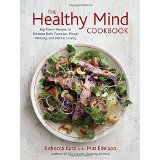
CHOCOLATE CHERRY WALNUT TRUFFLES
MAKES ABOUT 20 TRUFFLES • PREP TIME: 15 minutes • COOK TIME: 21/4 hours or 15 minutes if you place the chocolate mixture in the freezer.
My dad, Jay, had this delightful habit; whenever you told him something that struck his fancy, he’d
roar, “That’s FANTASTIC!” and gleefully clap his hands for emphasis. This was doubly true if you
told him he was getting chocolate for dessert. Jay never met a piece of chocolate he didn’t like, and
I have a feeling that just hearing what’s in these truffles—dates, cherries, and walnuts, smothered
in chocolate, rolled in coconut and curry—would’ve given him cause to offer up a standing ovation.
Studies suggest walnuts may boost memory, while chocolate, as we all know, is the ultimate mood boosting
agent. One bite of this dessert and you’d be hard-pressed to feel any stress.
Ingredients:
2 tablespoons boiling water
2 ounces dark chocolate
(64 to 72% cacao content),very finely chopped
1/2 cup walnuts
1 tablespoon unsweetened cocoa powder
1 cup pitted and halved Medjool dates
1 teaspoon vanilla extract
Sea salt
1/4 cup finely diced dried cherries
2 tablespoons shredded coconut
1/4 teaspoon curry powder
Stir the boiling water into the chopped chocolate and let it stand for 30 seconds. Using a small whisk, stir until the chocolate is completely melted and glossy. Coarsely grind the walnuts in a food processor, then add the cocoa powder, dates, vanilla, and 1/8 teaspoon of salt, and process for a minute. Then add the chocolate mixture and process until smooth, another minute. Transfer to a bowl and stir the cherries into the chocolate mixture.
Cover and chill for approximately 2 hours, in the refrigerator or 20 minutes in the freezer until firm. On a plate, mix the coconut, curry powder, and a pinch of salt. Scoop up approximately 2 teaspoons of the chilled chocolate mixture and roll it into a smooth ball between your palms, then roll it in the curried coconuts to coat. Repeat with the remaining mixture, then place the truffles in an airtight container and chill thoroughly before serving.
COOK’S NOTE: If you want to give the truffles a golden hue, toast the coconut in a 300°F oven for 10 to 15 minutes. For a more distinctive taste, add another ¼ teaspoon of curry powder.
To learn more about Rebecca, her books, speaking, and to get great tips on healthy foods, please visit her website at Rebeccakatz.com
Deborah Shouse is the author of Love in the Land of Dementia: Finding Hope in the Caregiver’s Journey.
Unwrapping a Halloween Surprise
Do you remember trick or treating as a kid, racing down the street, dressed as a superhero or a princess or a witch, eager for treats? When I was growing up, I loved the freedom and surprise of that holiday and I continue to love the scintillating spookiness and dramatic dress of the holiday. Here’s a story about a Halloween gift I received in a memory care unit. Click here if you’d like to watch a video of the story or read on, if you prefer the written word. Either way, I hope you’ll “treat” yourself right this October 31.
Warmly,
Deborah
My Caregiver’s Two-Letter Halloween Treat
On my mother’s last Halloween, her memory care unit held a party. Pam, the nurse, brought a basket brimming with hats, shawls, and scarves. Pam set a floppy white hat on Mom’s silvery curls and draped a lacy purple shawl over her shoulders. In her new adornments, Mom looked both puzzled and happy.
But during the “treat” portion of the Halloween celebration, which featured M & M’s and chocolate chip cookies, Mom’s smile was unambiguous. All her life, Mom had adored sweets and her Alzheimer’s had not dimmed her enjoyment.
Then small children paraded through the facility, dressed as princesses, witches, super heroes, and ghosts. Volunteers handed the residents wrapped tootsie rolls.
“For the children,” they said.
Mom smiled at the adorable kitty cats and pirates who chanted “Trick or treat,” in wispy voices, but she did not relinquish her hold on the sweets; she did not share her candy.
“Mom, would you like to give the children some of your candy?” I asked as my mother gripped her treasure.
“No,” she said.
No. The word floated through my mind and I gazed at Mom, my mouth open, my mind euphoric. Perhaps I should have been chagrined at her selfishness but instead I was thrilled that she had actually responded to my question. It was the closest we’d come to conversation in weeks. I laughed with delight. Mom laughed.
For that moment, we were two women, laughing at ourselves, laughing at life, simply laughing. For me, it was a most wondrous and unexpected treat.
*****
Please share one of your unexpected treats.
Deborah Shouse is the author of Love in the Land of Dementia: Finding Hope in the Caregiver’s Journey.
